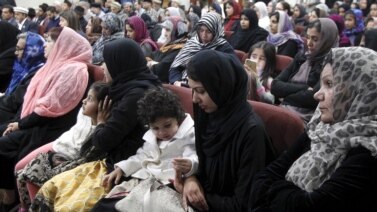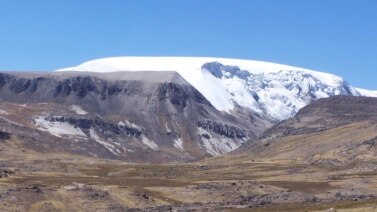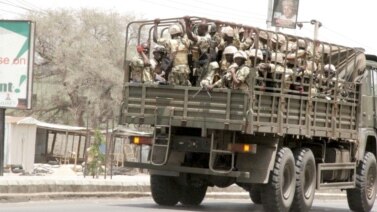
China made major promises of money and other support to the United Nations on Monday.
President Xi Jinping spoke at the U.N. General Assembly at the organization’s headquarters in New York City.
Mr. Xi talked about how his country would help keep peace, reduce climate change and support world development.
President Xi spoke to the U.N. for the first time as China’s leader. He promised $1 billion in aid to the U.N. peace and development fund.
He also said China would create a reserve force of 8,000 U.N. peacekeeping troops. And, he announced the country would give $100 million in military assistance to the African Union over the next five years. He said the money would be provided to help fight terrorism in Africa.
In Mr. Xi’s words, China "will continue to uphold the international order." He noted that the $1 billion would be provided over 10 years to increase international cooperation.
The Chinese president called for supporting talks instead of “confrontation." He said that nations should treat each other as equals. “The big, strong and rich,” he said, “should not bully the small, weak and poor."
China has been accused of aggression over territorial issues in the South China Sea. China, the Philippines and Vietnam are among countries disputing control of areas in the sea. The territory includes land, coral reefs and lagoons.
The area is a busy shipping path. It also may contain oil and gas. Last year, Vietnamese fishing boats clashed with Chinese ships near a disputed oil rig that Beijing set up last year.
China has also been working to build islands from reefs in the area. Recent satellite photos suggest the project now includes a third airplane landing path on Mischief Reef. The runway would be just 39 kilometers from a Philippine warship. The Philippines grounded the old ship in 1999 to use as a marine position.
Inclusive development
Critics have argued that China has not held its share of responsibilities in world issues.
On Saturday, at a U.N. Sustainable Development Summit, President Xi promised to give $2 billion to an international development fund for poor countries. Yet, China itself remains a developing country. The World Bank reports nearly 99 million people in the country live in poverty.
On Monday, Mr. Xi told world leaders that development is meaningful only when it includes all countries.
He later said that Chinese leaders in business and beyond are ready to share their development experience and possibilities with other countries. He said “we welcome other countries to board China’s express train to development."
Until recently, China’s economic development has surged, pushing millions of its 1.3 billion citizens into the middle class. The World Bank says China competes with the United States as the world’s leading economy.
However, China worried international investors with its explosive stock markets and shrinking growth rate. The rate of growth last year was predicted to be 7.4 percent. In reality, it was 7.3.
President Xi promised the world leaders that his country would continue its market reforms.
Dealing with climate change
At the U.N., Mr. Xi again confirmed China’s plan to lessen climate change. In June, the country officially promised to lower its carbon releases by at least 60 percent by 2030.
"We should build an ecosystem that puts Mother Nature and green development first," the Chinese leader said Monday. He called for all developed countries to honor their promises to reduce pollutive gas releases.
I'm Caty Weaver.
Carole Guensburg reported this story for VOA. Caty Weaver wrote it for Learning English. Kathleen Struck was the editor.
Words in This Story
reserve – n. a military force that is additional to the regular forces and that is available if it is needed
confrontation – n. a situation in which people, groups, etc., fight, oppose, or challenge each other in an angry way
bully – v. to cause (someone) to do something by making threats or insults or by using force — usually + into
rig – n. a structure above an oil well on land or in the sea that has special equipment attached to it for drilling and removing oil from the ground
fund – n. an amount of money that is used for a special purpose
surge – v. to suddenly increase to an unusually high level





